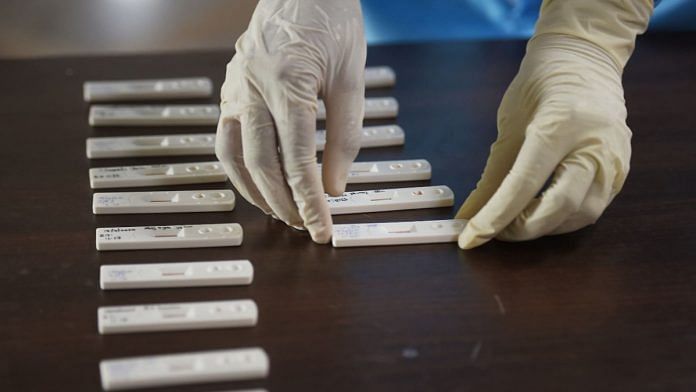New Delhi: A coronavirus vaccine candidate — developed by US-based biotechnology company Moderna — has shown promising results in the phase one of clinical trials.
The ten-year-old company was the first to launch a human clinical trial for the potential vaccine against SARS-CoV-2 virus in March this year.
The trials involved 45 healthy volunteers aged 18 to 55 years over approximately six weeks.
According to a statement issued by the company Monday, participants were divided into three groups of 15 people each. All of them were found to have developed antibodies on day 15 after a single dose of mRNA-1273, the vaccine candidate, the statement said.
The first group received two 25 microgram (µg) of the vaccine initially. Two weeks following the second dose, levels of binding antibodies in the participants were at the levels seen in blood samples from people who have recovered from Covid-19.
On Day 43, the second group that received two shots of dose level 100 µg, had binding antibodies significantly higher than what was observed in recovered Covid-19 patients.
Results from the third group, which received one shot of 250 µg are not yet available.
Neutralising antibody data is available only for the first four participants in each of the 25 µg and 100 µg dose-level groups at this time, and mRNA-1273 elicited neutralising antibodies in all these eight participants.
The levels of neutralising antibodies on Day 43 were at or above levels generally seen in recovered Covid-19 patients, Moderna said.
Also read: US will get Sanofi’s coronavirus vaccine first if the drug giant’s efforts succeed
The side-effects
The vaccine candidate was overall safe and well-tolerated.
However, one participant who received the 100 µg dose experienced redness around the injection site. Three participants, who got the 250 µg dose, developed adverse systemic symptoms, following the second dose.
While Moderna did not elaborate what these symptoms were, it said all adverse events were self-resolving.
“These interim Phase 1 data, while early, demonstrate that vaccination with mRNA-1273 elicits an immune response of the magnitude caused by natural infection starting with a dose as low as 25 µg,” Tal Zaks, Chief Medical Officer at Moderna, said in the statement.
“When combined with the success in preventing viral replication in the lungs of a pre-clinical challenge model at a dose that elicited similar levels of neutralising antibodies, these data substantiate our belief that mRNA-1273 has the potential to prevent Covid-19 disease and advance our ability to select a dose for pivotal trials,” Zaks said.
Phase II trial likely to start in July
Pre-clinical study of the vaccine in mice showed mRNA-1273 prevented viral replication in the lungs of the animals infected with SARS-CoV-2.
Based on these findings, researchers will now amend the study to include a 50-µg dose-level cohort across each of the three groups.
For the next phase of the trial expected to start in July, the vaccine doses will be between 25 µg and 100 µg.
“We are investing to scale up manufacturing so we can maximize the number of doses we can produce to help protect as many people as we can from SARS-CoV-2,” said Stéphane Bancel, Chief Executive Officer at Moderna.
Science behind the vaccine
Moderna started its operations in 2010 and has since received grants from the US government’s Defence Advanced Research Projects Agency as well as the Bill and Melinda Gates Foundation, a philanthropic organisation.
The company works specifically on drugs and vaccine candidates made of ‘messenger RNA (mRNA)’.
The mRNA is a molecule that genetically encodes a set of instructions, based on which cells make proteins and send them to various parts of the body.
Medicines based on mRNA technology take advantage of normal biological processes of the body to create the desired therapeutic effect, according to the company.
Instead of introducing protein drugs to the body, mRNA drugs trigger cells to produce the required proteins to fight off an infection. This method prevents the immune-system response from kicking in and hampering the effect of a drug.
Also read: How India can be a world leader in making Covid vaccine and keeping it cheap too



